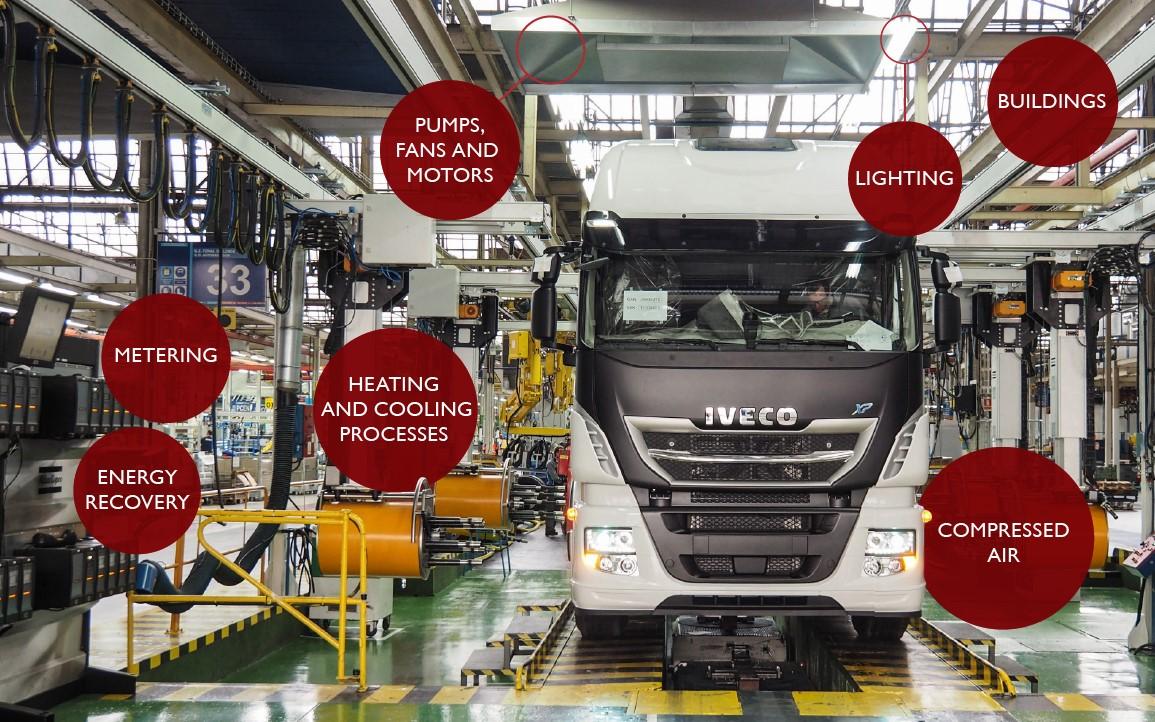The Energy-Efficient Production Line

One of the pillars of the World Class Manufacturing (WCM) program focuses on the reduction of energy consumption. The IVECO plant in Valladolid, Spain, which recently achieved Gold status in WCM, demonstrates the extensive range of energy-saving initiatives across CNH Industrial’s facilities that support its sustainability goals in manufacturing.
In April 2019, the IVECO plant in Valladolid, Spain, achieved Gold status in the World Class Manufacturing (WCM) program, demonstrating CNH Industrial’s commitment to safety, efficiency and sustainability.
Reducing energy consumption through WCM
The WCM program is a pillar-structured system based on continuous improvement of the integrated management of manufacturing plants and processes. It is recognized as one of the global manufacturing industry’s highest standards and is designed to eliminate waste and loss from the production process by identifying objectives such as zero injuries, zero defects, zero breakdowns and zero waste. All WCM pillars are evaluated and certified through a system of periodic third-party audits, providing an overall score for each plant according to three achievement levels: Bronze, Silver and Gold.
The WCM Energy and Environment pillar focuses on optimizing energy use in manufacturing processes. As a management tool it enables each plant to understand, monitor and optimize energy consumption and, consequently, the impact of CO2 emissions generated during manufacturing operations. Reducing these translates into benefits for the environment and lower production costs. The IVECO plant in Valladolid scored highly in this category.
Saving and generating energy
The IVECO factory in Valladolid is the second CNH Industrial site to achieve WCM Gold status – since the IVECO plant in Madrid, Spain, did so two years ago. Despite the highly complex production process of the IVECO Daily van range – which includes 11,000 product configurations, around 350 colors and six different body types – the Valladolid plant’s continued efforts to eliminate waste and reduce energy consumption let to impressive marks for the WCM Energy pillar during third-party audits.
As well as saving energy, the Valladolid plant also generates some of its own. This is thanks to the newly installed solar-powered SmartFlower™ a photovoltaic energy generator that follows the sun’s path in the same way that sunflowers do. By keeping its panels at a 90-degree angle to the sun, it generates up to 40 percent more energy compared to static panels, and its self-clean and self-ventilation functions ensure minimal maintenance is required.
Similarly, the Madrid plant installed the SolarWall® – a custom-designed cladding system fitted onto its exterior walls that uses solar energy to heat and ventilate its interior spaces. Solar-heated air is distributed throughout the building via the existing HVAC (heating, ventilation and air-conditioning) system, reducing the energy load on the conventional heating system.
Company-wide initiatives
CNH Industrial continually invests in energy-efficiency initiatives at all of its plants around the world. Some of these are simple modifications that produce impressive results. They include redesigning industrial processes, insulating buildings, introducing LED lighting, and retro-fitting improvements to existing equipment, among many others.
Buildings
Roofs are regularly upgraded, and walls insulated to save energy. Rapid-close doors are installed wherever possible to keep heat in.
Pumps, fans and motors
Ventilation manages and helps regulate air changes on the shop floor. Aeraulic systems have been introduced in plants to check and optimize the air flow generated by pumps, fans and motors, which have also been fitted with inverters to modulate electricity use, optimizing consumption and reducing emissions.
Heating and cooling processes
Metering has been expanded across all of CNH Industrial’s plants to monitor electricity consumption, and new start-up and shutdown procedures have been introduced at the start and end of the working day to help save energy when production lines are idle.
HVAC systems have been upgraded and made more efficient, and ovens such as those used during the painting process have been insulated to reduce overall energy consumption.
Lighting
CNH Industrial has an ongoing program of upgrading lighting both inside and outside its plants, installing high-efficiency LED lights, presence detectors and dimmers. Wherever possible, skylights are incorporated into the roofs of buildings to exploit natural daylight, which not only helps reduce energy consumption, but also enhances the working environment.
Compressed air
Compressed air is used during assembly, painting and welding processes. Overall pressure has been lowered to save energy, and the air pipes are continually monitored to ensure they are in optimal condition to improve efficiency and modulation. During idle periods, heavy compressed-air machinery is shut down in favor of portable compressors.
Energy recovery
Heat recovered from painting ovens and compressors is reintroduced into the system and used for the generation of chilled water to reduce the amount of primary energy required.
Training and tangible results
In 2018, CNH Industrial invested some $7.9 million in improving energy performance and reducing energy consumption. A total of 195 technical and management initiatives focused on energy efficiency – such as the SmartFlowerTM generator at the Valladolid plant and the SolarWall® system in Madrid – were implemented at its plants worldwide. These initiatives resulted in an annual reduction in energy consumption of 160 terajoules (enough to power 4,273 average US homes for a year according to the U.S. Energy Information Administration) and a reduction in CO2 emissions of over 11,800 tons (equivalent to the total annual emissions of 711 average US homes according to the U.S. Department of Energy).
The Company’s energy management structure consists of a dedicated team of 85 professionals, located at both corporate offices and plants. In 2018, more than 15,000 hours of energy performance and efficiency training were provided to 10,217 staff across various sites to encourage continuous improvement.
CNH Industrial is committed to continually improving its environmental policies across all company segments worldwide. Last year the Company set the following targets for the reduction of energy consumption and CO2 emissions by 2030:
- 90% of total electricity consumption to be derived from renewable sources
- -60% reduction in CO2 emissions per production unit at Company plants worldwide vs 2014 levels
- -30% reduction in energy consumption per production unit at Company plants worldwide vs 2014 levels
Achieving WCM Gold status at the plants in Valladolid and Madrid, Spain represents another key milestone in this process.

